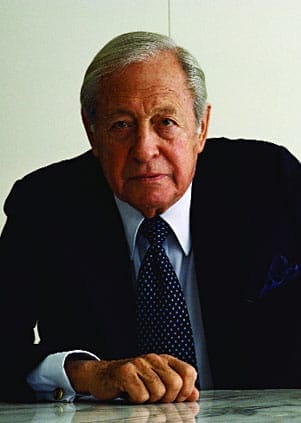 The New York Times wrote that CBS founder William Paley was to broadcasting what “Carnegie was to steel, Ford to automobiles, Luce to publishing and Ruth to baseball.” High praise, but it’s difficult to be hyperbolic when discussing Paley’s influence. Chicago native Paley returned to the family cigar business after Wharton. In 1927 his father purchased a few struggling radio stations with a thought to use them for advertising his products, but the younger Paley had bigger ideas. He soon built them into a fledgling group of radio stations called Columbia Broadcasting System, better known as CBS, the broadcasting company he ran for half a century.
The New York Times wrote that CBS founder William Paley was to broadcasting what “Carnegie was to steel, Ford to automobiles, Luce to publishing and Ruth to baseball.” High praise, but it’s difficult to be hyperbolic when discussing Paley’s influence. Chicago native Paley returned to the family cigar business after Wharton. In 1927 his father purchased a few struggling radio stations with a thought to use them for advertising his products, but the younger Paley had bigger ideas. He soon built them into a fledgling group of radio stations called Columbia Broadcasting System, better known as CBS, the broadcasting company he ran for half a century.
Paley’s ideas about radio, then television, were new and bold. Before Paley, individual stations bought programming from the network and were considered the network’s clients and primary revenue source. Paley changed broadcasting’s business model. He provided network programming to stations at nominal cost, instead of relying on advertisers for revenue. As stations and viewers grew under those favorable terms, advertisers paid more. For more than 20 years under Paley’s stewardship, CBS TV led prime-time ratings. Not only a business innovator, Paley’s rarer genius was in lining up programming the public wanted. He brought Jack Benny and Frank Sinatra to CBS radio, and shows like I Love Lucy, All in the Family, M*A*S*H, and 60 Minutes to CBS TV.
Even more influentially, he built CBS News. Many among today’s viewers encountered Paley for the first time as a character in the 2005 film Good Night, and Good Luck, based on the true story of newsman Edward R. Murrow’s battle with Senator Joseph McCarthy. The actor playing Paley intoned inspirationally, “I’m with you today, Ed. And I’m with you tomorrow.” It was Paley who believed that news could be a pillar for the station and its audience. CBS News began its influence prior to World War II on the radio and continued on television under Murrow, Walter Cronkite, and Dan Rather.
Paley, who died in 1990, made history—and preserved it. He founded what is now the Museum of Television and Radio, and the New York building is named in his honor.

























